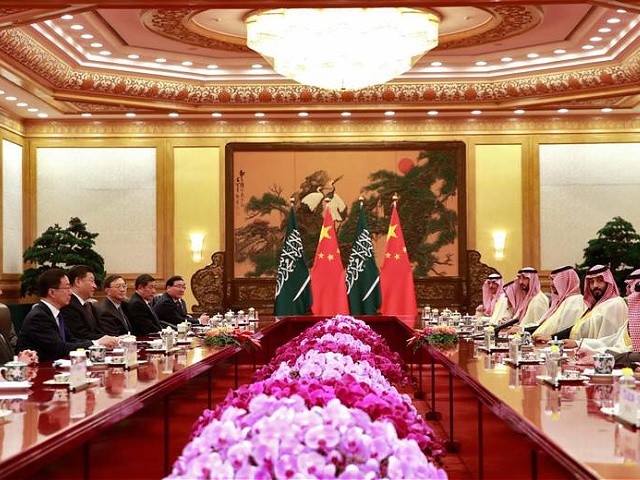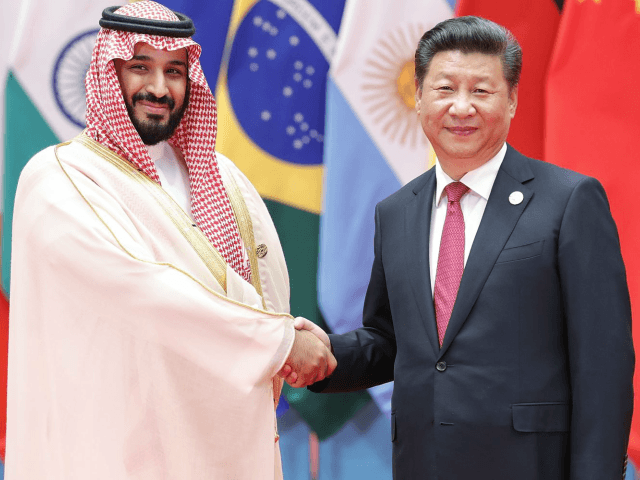Saudi Arabia’s de facto leader, Crown Prince Mohammed bin Salman (MBS), discussed his “strategic partnership” with Chinese Communist dictator Xi Jinping in a phone call on Friday.
MBS and Xi discussed “ways to further the work of the Saudi-Chinese Joint Committee” and “international situations and issues of common interest,” according to the state-run Saudi Press Agency (SPA).
Al-Arabiya News described the phone call as the first known interaction between the two since MBS sent condolences to Xi for the China Eastern Airlines plane crash on March 21, in which all 132 passengers and crew were killed.
Chinese state media said Xi told MBS he considers developing closer relations with Saudi Arabia to be a “priority.”
“The Chinese side supports Saudi Arabia in safeguarding national sovereignty, security and stability, and in independently exploring a development path suited to its own national conditions,” Xi reportedly said.
Xi offered MBS support for programs such as Saudi Vision 2030, the road map for diversifying the oil-based Saudi economy, and Saudi Arabia’s “Green Middle East” initiative, in exchange for Saudi “synergy” with China’s Belt and Road infrastructure program.
“China is ready to work with Saudi Arabia to promote peace and stability in the Middle East, push for an early conclusion of the China-Gulf Cooperation Council free trade area agreement and jointly build a China-Arab community with a shared future for the new era,” Xi said.
According to Chinese news reports, MBS promised Saudi Arabia would help protect the regime in Beijing from international consequences for its brutal oppression of the Uyghur Muslims. Given China’s enthusiasm for “the rights of all countries to choose their own political and human rights paths independently,” MBS can expect little criticism from Beijing for his own offenses.

Saudi Crown Prince Mohammed bin Salman attends a meeting with Chinese President Xi Jinping at the Great Hall of the People in Beijing on February 22, 2019. (Photo credit should read HOW HWEE YOUNG/AFP via Getty Images)
Germany’s Deutsche Welle (DW) noted that China purchases about a quarter of Saudi Arabia’s oil exports and has been pressuring the Kingdom to let it buy that oil with yuan instead of dollars, which would be a major step toward the long-held Chinese goal of dethroning the U.S. dollar as the worldwide oil currency.
DW pointed out that if the Saudis help China establish the yuan as an oil currency, it could give China’s ally Russia an easy path to avoid worldwide sanctions imposed after Russia attacked Ukraine.
Saudi Arabia does a great deal of business with China and its monarchs might understandably be interested in joining a new world order in which Western concepts of human rights and individual liberty have been completely erased.
Also, as DW delicately suggested, the Saudis have noticed Western nations are recklessly throwing themselves off the “green energy” cliff while China remains unapologetically interested in fossil fuels. It is not hard to imagine Riyadh sees the Chinese as more reliable customers for their flagship petroleum products.
On the other hand, some foreign policy analysts believe the Saudis enjoy flirting with China mostly to keep Western governments on their toes, forever dangling a full alliance with Beijing as a “bargaining chip” to squeeze concessions from the U.S. and Europe.
The growing alliance between Saudi Arabia and China could face a major test over the next few days as the Saudis are thinking about deporting a Uyghur woman named Buheliqiemu Abula and her 13-year-old daughter to China over the strenuous protests of human rights advocates.
Abula told Amnesty International (AI) on Thursday her Saudi jailers gave her coronavirus tests and she believes they could ship her to China at any time. She and her daughter will almost certainly be thrown into China’s brutal concentration camps in Xinjiang province if that occurs.
Two Uyghur men are also lined up for extradition to China. AI urgently demanded Saudi Arabia halt all four deportations.
“Forcibly returning these four Uyghur people would be an unconscionable violation of Saudi Arabia’s obligations under international law. The Saudi authorities must not even think about sending them to China, where they will be subjected to arbitrary detention, persecution and possibly to torture,” said AI Deputy Regional Director for the Middle East and North Africa Lynn Maalouf.

COMMENTS
Please let us know if you're having issues with commenting.